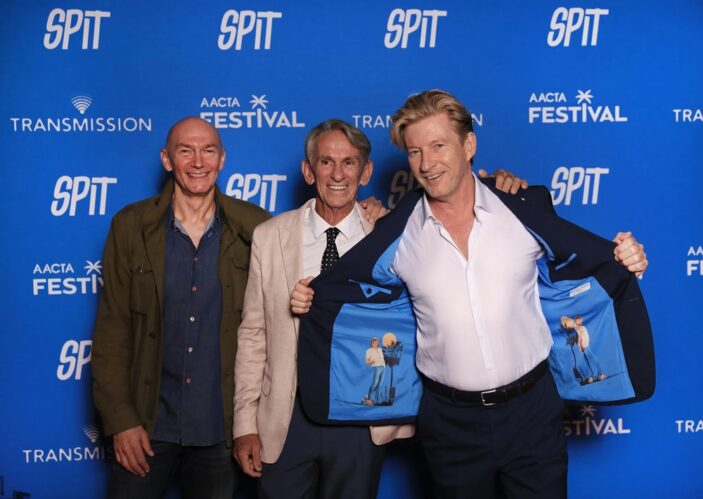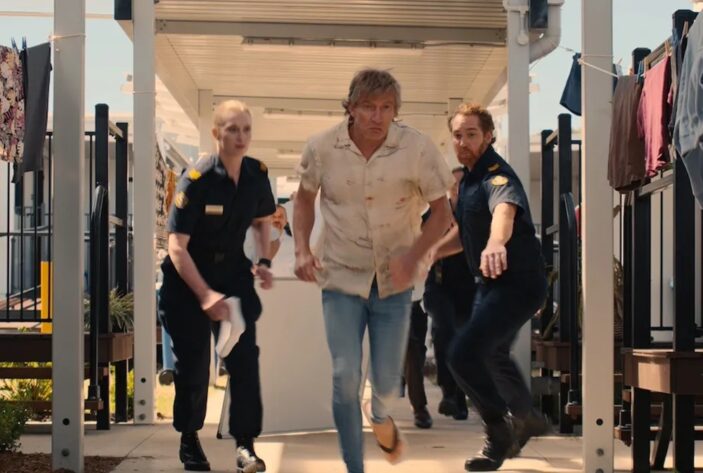
22 years on from its predecessor premiering at the Brisbane International Film Festival, Spit, the long awaited sequel to Aussie crime comedy Gettin’ Square, kicked off its proceedings last month at the AACTA Festival, where director Jonathan Teplitzky and Johnny “Spit” Spitieri himself, David Wenham, introduced the film before it toured across the country on its national tour.
After 20 years on the run overseas, small-time ex-criminal Spit slips back into Australia on a false passport only to find himself locked up in an Immigration Detention Centre with a massive target on his back as old enemies come looking for him, determined to settle old scores. As he struggles to stay one step ahead, the resourceful Spit finds new friends in detention, teaching them his version of mateship, and what it means to be truly Australian.
As Spit arrives in Australian theatres (you can read our review here), our Peter Gray, who had the pleasure of introducing both Jonathan and David at a special Brisbane screening, later sat down with the two to discuss the sequel’s origins, the importance of embracing the character’s idiocrasy, and how easy it was for them to rediscover the character after two decades.
I wanted to first ask you both about the name gag when Spit writes the detainee’s names down in the most unique way. Was that something that was always there in Chris’s script? Or did either of you embellish?
David Wenham: A lot of that stuff was a mixture. The film is definitely the blueprint of Chris’s script. It’s such clever writing. The set-up is ingenious. And some of the actors bring stuff that you just can’t think of. Sometimes it’s those real left-of-field surprises that add to it. I can’t say definitively one way or another.
Jonathan Teplitzky: Also, that moment, where (Spit) writes the name Trevor. It’s perfect comedy. Writing Trevor as Trev-VA just got the laugh, but it’s the R that (David) writes after it. That’s the hilarity. It’s just the set-up.
Given Chris’s legal background, was there anything that he revealed, either through the script or in conversations, that surprised you?
David Wenham: The only thing that he was really letting us in on is his obsession with acronyms. Oh my god, he’s such a stickler for details. So we’d all say things around the legal qualifications, like it’s the P, Y, F, K, L, and Chris would say, “No, it’s the P, Y, F, K, M.” No one would really know the difference except Chris, so it was, like, “Yeah, we’ll go along with it.”
Jonathan Teplitzky: But that’s also lawyer speak. That’s the language he speaks most of the time.
David Wenham: But as ridiculous as it is, he wants it. He wants it all to be based in reality, which is great, because the characters have to be real in order for them to be funny. And then we’re all on the same page.
I think that’s one of the things about Spit, as a character, that resonates. He’s this comical, outlandish character, but you just want the best for him. He makes mistakes, but he’s so inherently human.
David Wenham: He’s a good man. Chris always says that he believes that everybody is good, but some things happen to people along the way that makes them go down a different path. It’s out of their control. And that’s what happens to Spit. We get to see that in this film, exploring his personal life and how he became the man he is. And you’re right. We root for him. We want him to succeed because he’s a good man. He’s unjudgemental. He doesn’t care who you are, what you look like, what you do for a job…he doesn’t care. So you want him to do well.
Jonathan Teplitzky: Well, the interesting thing is that in a world full of enablers, Spit gives people permission to be flawed. That’s the universality of it. I think a lot of people go to the cinema and they don’t necessarily identify with characters because they’re too good or too bad. It’s the grey area that you can never quite pin down. Is he the smartest guy in the room? Is he the dumbest? Is he the kindest? It’s not in the details, but in the essence.
With the physicality of the Spit, the things you do with your face and posture…was that all stuff that just came back to you easily? Did you know you still had it in you?
David Wenham: When I went to drama school, I always thought I was a character actor and all I wanted to do was perform on this particular stage in Sydney. It was called Nimrod. And after graduating from drama school, I became a member of that company for a few years, and I did plays, and I thought I was in seventh heaven. That was the peak of my ambition.
Then my career took a very left hand turn, and I ended up doing mostly movies and television for the last, how many years? And a lot of that stuff was much straighter than I ever anticipated I’d be doing. But the stuff that gives me the most enjoyment is playing characters far removed from myself. I love comedy and the physical stuff. I love having the opportunity, or the permission, to be an idiot (laughs). I remember seeing a big sign at drama school that said, “If you’re not prepared to look like an idiot, you don’t belong here.”

Speaking of looking like an idiot, was there any digital trickery in you performing “the floss?” Did that take time to perfect?
David Wenham: Not really. One of my daughters taught me a long time ago. And it was never planned. It was just a day where Jonathan set up a shot and told me to play. Do something ridiculous. And so I did.
As an actor and filmmaker, was there anything during the course of Spit that you learned about yourselves?
Jonathan Teplitzky: I’m not sure if this quite answers the question, but it really just reiterated to me how enjoyable the process is. As I’ve gotten older and done more, I realised how great the process is and how much you have to respect it. It’s also about trusting the material, trusting the people and, in a way, going with that momentum. It just reinforced the idea, rather than it being a revelation.
David Wenham: Yeah, I don’t know if I’d learnt anything, but it did reinforce a whole heap of things. It was unquestionable one of the most enjoyable and creative periods for me. Working with Jonathan, working with the crew, it was a joy to turn up every day and just let things happen organically and spontaneously. I don’t learn my lines in any particular way. They’re just in my head. Then I wait for whatever comes my way, and when you’re relaxed and at ease and have confidence in everyone around you, that’s when you do some really interesting stuff. It was a joy to make, and hopefully that translated to the screen.
Oh, absolutely. There are films you watch that you can tell were clearly very fun for the actors to make, but it hasn’t translated. Here, it completely shines through.
Jonathan Teplitzky: I think that’s a great testament to everyone who worked on it. And Chris’s writing, too. Writing isn’t just about writing the funny things, it’s about creating a sense of unexpected funny. I remember so clearly when we were filming Gettin’ Square where David is running down the street in his underpants. We were going to film that in a different location in Brisbane, and the owner of the pub whose window David was going to climb out of found out about the shoot and basically vetoed it.
The last minute we had to find another location, and it was quite unplanned for David to climb down the pipe. This perfect comedy drain pipe that just happened to be there. There were so many things that just came together. Him running down the street was, I think, two takes and then we went home, not thinking it would be this mythological underpants moment (laughs).
We have Spit here as a sequel, and there are smatterings of his beginning here too. Was there ever a conversation of making a Gettin’ Square prequel?
Jonathan Teplitzky: We wanted to move on from Gettin’ Square. We always wanted to do something with Spit’s character, but it couldn’t just be another version of Gettin’ Square. We needed to give the audience something more.
David Wenham: He was such a special character on the page. But the extraordinary thing is how he’s stuck with people, and audiences can quote his lines. And not just his lines, but quotes from that film in general.
Jonathan Teplitzky: It’s being passed down from generation to generation. People who first saw the film when it came out, they’re showing their kids. There’s that transference of something kind of special, and as David said, you want to be friends with him. You care about this character, and so people are invested in that. You can’t ask for anything more from an audience than to invest in the characters and the story you’re trying to tell.
Spit is now screening in Australian theatres.
